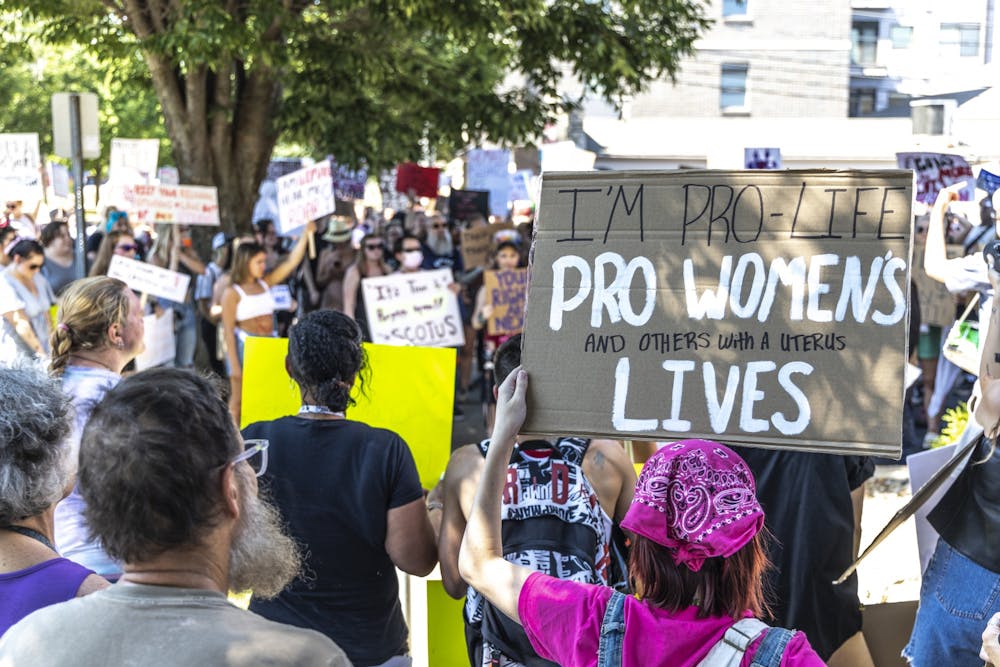After the United States Supreme Court overturned the 1973 Roe v Wade decision in late June, it left decision-making on abortion laws to the states, and Indiana lost no time implementing its near-total ban in August. The ban blocks all abortions, except in cases of rape, incest or the birth posing serious health risks to the pregnant person, according to the Indiana Senate Bill 1.
Related: [Abortion ban passed by Senate, signed by governor]
It will take effect this week on Sept. 15. And this decision will affect hospitals, clinics and medical professionals across the state.
IU Health anticipated the decision would affect its healthcare services for pregnant people. The healthcare system is the largest network of physicians in the state and where many receive their primary healthcare.
Dr. David Ingram, chief medical executive and executive vice president, and Dr. Caroline Rouse, assistant of clinical obstetrics and gynecology, announced upcoming adjustments to accommodate what will change with the ban.
With this ban, doctors risk their licenses if they act outside of it. IU Health has a variety of women’s healthcare services for healthcare workers, including attorneys to provide information about the legal boundaries they have to provide for patients. Due to the new legislation and procedures, IU Health has also established a 24/7 rapid response team for health care providers or physicians, who could need clarity on certain procedures or legal concerns. The services entail how physicians can work within the new law.
IU Health formulated 10 teams in response to the ban. The teams primarily work and assert the legal boundaries they can work in to serve a patient. With as many teams and systems have been implemented to combat the upcoming ban, Ingram said she believes the plan will work efficiently.
Their team was faced with over 80 issues relating to where pregnant people can receive health care, Ingram said. They also accessed data on where abortions could be legally done before the ban and the number of patients they predict will be affected.
This led the IU Health team to meet multiple times with Planned Parenthood. The number of patients looking for specific health care is expected to be larger due to the increase in pregnancies.
Related: [ACLU lawsuit filed against Indiana’s abortion ban in Monroe County]
The ban states all abortions must be done in a hospital, stripping abortion clinics of the ability to perform abortions. However, Rouse said that IU health will work within its barriers to ensure legal abortions can be conducted.
“We feel very confident about those processes,” Ingram said. “We’ve had a few walk-ins where we have tested our providers and feel we would be prepared.”
As of now, Ingram and Rouse said they have not seen or heard of any pushback or negativity from the state legislature on their plan. So far, there is not a situation where a provider can turn away a patient from being seen by a physician. IU Health has no plans in helping patients travel to other states for certain medical assistance, Rouse said.
“Our obligation as healthcare providers is to evaluate the patient and ensure medical stability,” Rouse said.
Jennifer Ann Drobac, a professor at Indiana University Robert H. McKinney School of Law, said this ban is going to be taxing on doctors' careers due to its serious medical repercussions.
“Doctors are going to be constrained because they are now facing thousands of dollars in penalties and fines and up to 6 years in prison if they make a mistake,” Drobac said.
She said legislatures, not medical professionals, constructed the ban. Drobac also said she questions if forcing a minor to give birth to a child is neglect or abuse— which is what the ban could entail for minors who become pregnant.
“Banning minors from access to abortion could be in contrast to Indiana’s Child Abuse and Neglect Law,” Drobac said. “I didn’t hear any debate on that.”
Indiana has a low infant mortality rate nationwide, ranking 36th in the U.S. In 2020, the maternal mortality rate was predicted to be 76 deaths per 100,000 births, according to the IndyStar.
For things to change, Drobac said Hoosiers need to become politically observant and vote for the ban to potentially be reversed in the future.
“For people who are losing their rights, the state will not stop if it feels it can further control what’s going on.”






